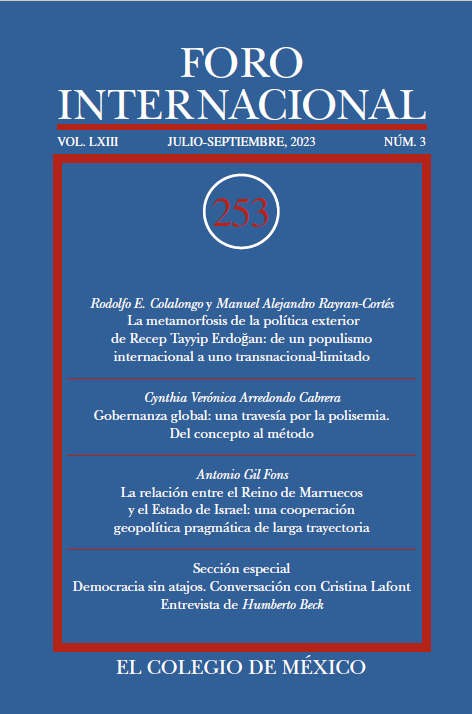Global governance: a polysemic journey. From concept to method
DOI:
https://doi.org/10.24201/fi.v63i3.2925Keywords:
actors, correlations, analytical category, complexity, global policy, problemsAbstract
In line with the growing popularity of the concept of global governance, critiques have been voiced of its lack of concreteness and clarity, since it takes on different meanings depending on the context, interpretations, and understandings of those who use it. To navigate this polysemic swamp, eleven different ideas related to global governance are analyzed in the light of the problems they address, the variables they correlate, and the non-state actors they consider. It also identifies three attributes of the concept that underpin its function as an analytical category in the understanding of global phenomena, as well as being the germ of a methodology of analysis.
Downloads
References
ACHARYA, A., “Global governance in a multiplex world”, Working Paper RSCAS 2017/2, Italia, Robert Schuman Centre for Advanced Studies, European University Institute, 2017. DOI: https://doi.org/10.2139/ssrn.2987838
AYRES, Jeffrey M., “Global Governance and Civil Society Collective Action: The Challenge of Complex Transnationalism”, International Journal of Political Economy, vol. 33, núm. 4, 2003. DOI: https://doi.org/10.1080/08911916.2003.11042911
BÚRCA, Gráinne de, Robert O. KEOHANE y Charles SABEL, “New Modes of Pluralist Global Governance”, New York University Journal of International Law & Politics, vol. 45, núm. 3, 2013.
COX, Robert W., “Reconsiderations”, en Robert W. Cox (ed.), The new realism: Perspectives on multilateralism and world order, Tokyo, Macmillan (International Political Economy Series), 1997, p. 259.
COX, Robert W., “Introduction”, en Robert W. Cox (ed.), The new realism: Perspectives on multilateralism and world order, Tokyo, Macmillan (International Political Economy Series), 1997, p. 8.
COX, Robert W., “An Alternative Approach to Multilateralism for the Twenty-first Century”, Global Governance: A Review of Multilateralism and International Organization, vol. 3, núm. 1, 1997, pp. 103-116. DOI: https://doi.org/10.1163/19426720-00301006
DELLA PORTA, Donatella y Sidney TARROW, Transnational protest and global activism. People, passions and power, Oxford, Rowman & Littlefield, 2005.
DINGWERTH, Klaus y Philipp PATTBERG, “Global Governance as a Perspective on World Politics”, Global Governance: A Review of Multilateralism and International Organizations, vol. 12, 2, 2006, pp. 185-203. DOI: https://doi.org/10.1163/19426720-01202006
FINKELSTEIN, Lawrence, “What Is Global Governance?”, en Global Governance: A Review of Multilateralism and International Organization, vol. 1, núm. 3, septiembre-diciembre de 1995, pp. 367-372. DOI: https://doi.org/10.1163/19426720-001-03-90000007
GONZÁLEZ, Jorge A., “Cultivar el conocimiento”, en Jorge A. González y Cicilia M. Krohling Peruzzo (eds.), Arte y oficio de la investigación científica: cuestiones epistemológicas y metodológicas, Ecuador, Centro Internacional de Estudios Superiores de Comunicación para América Latina, 2019.
HOFFERBERTH, Mathias, “Mapping the Meanings of Global Governance: A Conceptual Reconstruction of a Floating Signifier”, Millennium: Journal of International Studies, vol. 43, año 2, 2014, pp. 598–617. DOI: https://doi.org/10.1177/0305829814561539
HOOGHE, Liesbet y Gary MARKS, “Unraveling the Central State, but How? Types of Multi-level Governance”, American Political Science Review, vol. 97, núm. 2, 2003, pp. 233-243. DOI: https://doi.org/10.1017/S0003055403000649
KEOHANE, Robert O. y Joseph NYE, Power and interdependence (4.a ed.), Boston, Longman, 2012.
LATHAM, R., “Politics in a Floating World: Toward a Critique of Global Governance”, en M. Hewson y T. J. Sinclair (eds.), Approaches to global governance theory (SUNY Series in Global Politics), Albany, Nueva York, State University of New York Press, 1999.
LEVI-FAUR, David (ed.), The Oxford Handbook of Governance. Oxford Handbooks in Politics & International Relations, Oxford, Oxford University Press, 2012. DOI: https://doi.org/10.1093/oxfordhb/9780199560530.001.0001
LIPSCHUTZ, Ronnie D., “Crossing borders: Global civil society and the reconfiguration of transnational political space”, GeoJournal, vol. 52, núm. 1, 2000, pp. 17-23. DOI: https://doi.org/10.1023/A:1013162812371
MAYNTZ, Renate, New Challenges to Governance Theory, Italia, The Robert Schuman Centre at the European University Institute, 1998.
MURPHY, Craig, “Global Governance: Poorly Done and Poorly Understood. International Affairs”, Royal Institute of International Affairs, 76 (4), 2000, pp. 789-803, https://doi.org/10.1111/1468-2346.00165 DOI: https://doi.org/10.1111/1468-2346.00165
NYE, Joseph y Robert O. KEOHANE, “Transnational Relations and World Politics: An Introduction”, International Organization, vol. 25, núm. 3, 1971, pp. 329- 349. DOI: https://doi.org/10.1017/S0020818300026187
O’BRIEN, Robert, Annie Marie GOETZ, Jan Aart SCHOLTE y Marc WILLIAMS (eds.), Contesting global governance: Multilateral economic institutions and global social movements, Nueva York, Cambridge University Press (Cambridge Studies in International Relations, vol. 7), 2000.
PORRAS SÁNCHEZ, Francisco, Gobernanza. Propuestas, límites y perspectivas (2.a ed.), México, Instituto Mora y Consejo Nacional de Ciencia y Tecnología, México, 2019.
RHODES, R. A. W., “Waves of Governance”, en The Oxford Handbook of Governance, Oxford, Oxford University Press, 2012. DOI: https://doi.org/10.1093/oxfordhb/9780199560530.013.0003
RISSE-KAPPEN, Thomas (ed.), Bringing transnational relations back in: Non-state actors, domestic structures, and international institutions, Nueva York, Cambridge University Press, 1995. DOI: https://doi.org/10.1017/CBO9780511598760
RISSE-KAPPEN, Thomas, “Bringing transnational relations back in: introduction”, en Thomas Risse-Kappen (ed.), Bringing transnational relations back in: Non-state actors, domestic structures, and international institutions, Nueva York, Cambridge University Press, 1995, p. 15. DOI: https://doi.org/10.1017/CBO9780511598760
ROSENAU, James N. y Ernst-Otto CZEMPIEL, Governance without government. Order and Change in World Politics, Cambridge, Cambridge University Press, 1992, doi:10.1017/CBO9780511521775 DOI: https://doi.org/10.1017/CBO9780511521775
SENDING, Ole Jacob e Iver B. NEUMANN, “Governance to Governmentality: Analyzing NGOs, States, and Power”, International Studies Quarterly, 50 (3), 2006, pp. 651-672. DOI: https://doi.org/10.1111/j.1468-2478.2006.00418.x
SINCLAIR, Timothy J., Global governance. Key concepts series, Cambridge, Polity, 2012.
SIKKINK, Kathryn, “Patterns of Dynamic Multilevel Governance and the Insider-Outsider Coalition”, en Donatella Della Porta y Sidney Tarrow (eds.), Transnational protest and global activism. People, passions and power, Nueva York, Rowman & Littlefield, 2005, pp. 151-73.
SCHNEIDER, Volker “Governance and complexity”, en David Levi-Faur (ed.), The Oxford handbook of Governance, Oxford, Oxford University Press, 2012, p. 130. DOI: https://doi.org/10.1093/oxfordhb/9780199560530.013.0009
TARROW, Sidney y Donatella DELLA PORTA, “Conclusion: ‘Globalization’ Complex Internationalism, and Transnational Contention”, en Donatella Della Porta y Sidney Tarrow (eds.), Transnational protest and global activism. People, passions and power, Oxford, Rowman & Littlefield, 2005, p. 235.
VILLAMAR NAVA, Zirahuén, “Gobernanza Global y (su propio) desarrollo”, Revista de Relaciones Internacionales de la UNAM, enero-abril de 2017, pp. 135-149.
WEISS, Thomas G. y Rorden WILKINSON, “Rethinking Global Governance? Complexity, Authority, Power, Change”, International Studies Quarterly, vol. 58, núm. 1, 2014. DOI: https://doi.org/10.1111/isqu.12082













